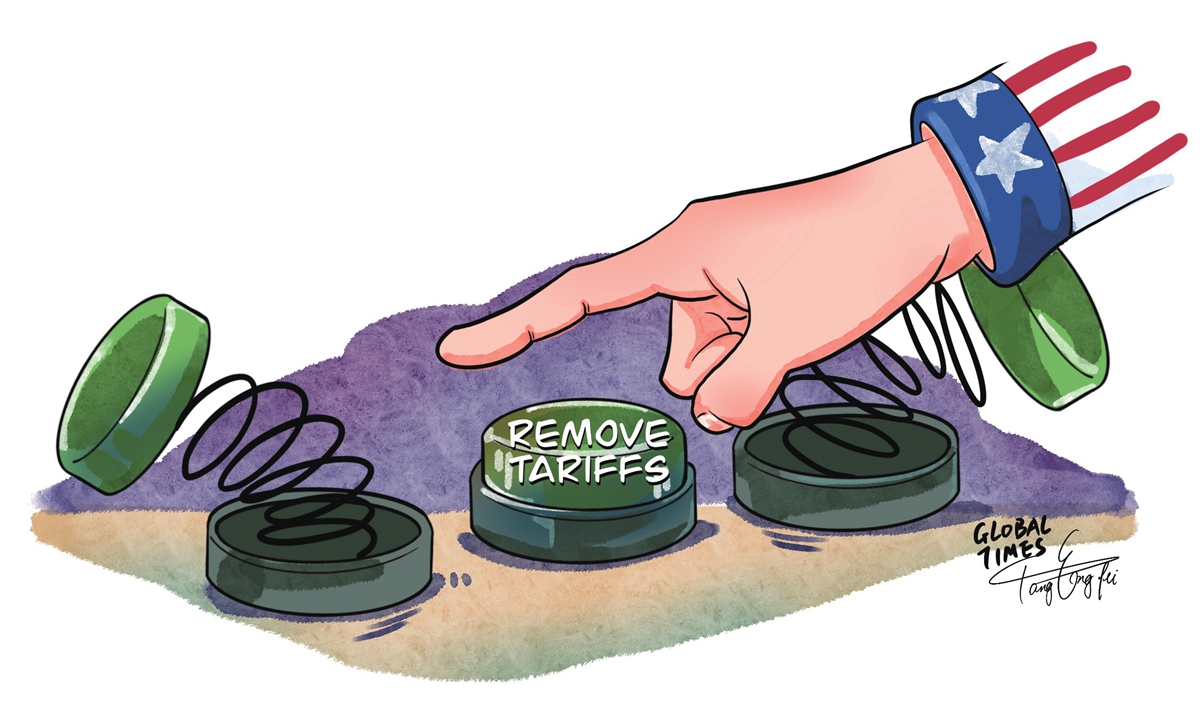
Illustration: Tang Tengfei/GT
It seems that the Biden administration is unable to resist the temptation of taking a zero-sum game approach to China despite the intertwined supply-chain links and the mounting inflationary pressure in the US, but the flawed mentality will only drive bilateral trade down a geopolitical dead end.US Trade Representative Katherine Tai said the US was preparing a new approach to China trade policy, suggesting that they will more actively pressure China to make concessions, Reuters reported on Saturday. And unidentified sources quoted by the report threaten that the new US trade probes may lead to tariffs or even trade embargoes against China.
Such rhetoric appears to be indicating a new trade war between the two countries, which may come as a bit of a surprise given the current inflationary pressure facing the US. Whether or not US political elites have recognized the complicated links between the US economy and the Chinese supply chain, it is not economically feasible if the US is seeking to escalate trade confrontation, instead of continuing cooperation with China.
It is no secret that the skyrocketing inflation in the US was partly caused by the unreasonable imposition of higher tariffs on Chinese goods. The COVID-19 pandemic has increased US reliance on Chinese supply chains, while global inflationary pressure is on the rise in the wake of the Russia-Ukraine conflict. Against such background, the Biden administration last week reinstated 352 expired product exclusions from US "Section 301" tariffs on Chinese imports.
The US is not unaware of the importance of China's supply chain to its economy, but its signaling of a new trade war indicated that the Biden administration does not take ordinary Americans' livelihood seriously, as the politicians in Washington are all handsomely paid.
It seems that the US trade policy toward China is based on the politicians' zero-sum mentality, seeking to crush China's economy as its ultimate target. This kind of zero-sum mentality that aims to overwhelm its opponent runs through the US foreign policy. By the way, the US sanctions on Russia and its decision on NATO's eastward expansion are both embodiment of such thinking.
The expansion of geopolitical rivalry into the trade area is irresponsible for the global economy that is already in great trouble in the post-pandemic era. Being the two largest economies in the world, the US and China need to assume special responsibilities to accelerate global economic recovery.
If Washington cannot overcome its Cold War zero-sum mentality on trade with China, its abuse of unilateral measures will impede the normal operation and growth of global industrial chains, adding more difficulty to the world trade and economy.
The problem with the US when it comes to trade with China is that it has failed to recognize the win-win nature of the US-China economic and trade relationship. What the China-US trade needs is how to further enhance cooperation and resolve conflicts. If the US persists imposing a geopolitical yoke on China, its trade policy toward China is doomed to a hit a dead end.
As far as China is concerned, its economic growth is unlikely to be much affected by the US posturing. China's economy continues to power ahead, growing 8.1 percent in 2021 with inflation rate lower than 1.5 percent, despite the punitive higher tariffs imposed by the US government.
